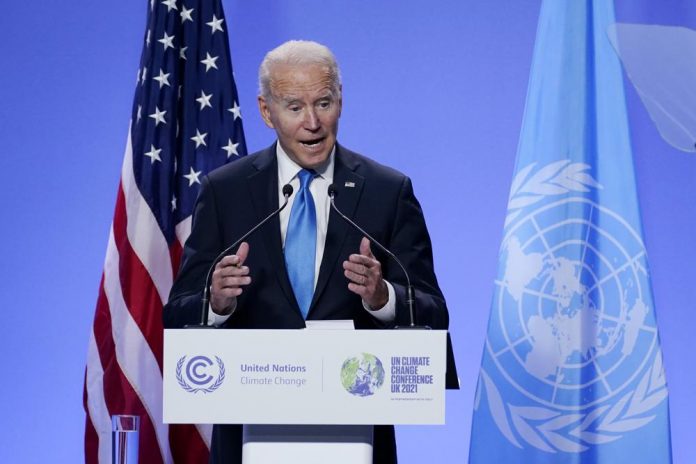Over five days abroad at two global summits, President Joe Biden showed a new willingness to openly confront China over climate change and its lack of leadership on the global stage.
Biden ended his time at the U.N. climate summit in Scotland on Tuesday by chastising Chinese President Xi Jinping for physically skipping the event and failing to make the level of commitments that roughly 100 other nations did to curb greenhouse gasses. Xi also avoided the earlier Group of 20 summit in Rome, allowing Biden to dominate the conversation as he met with his French, Italian, British and German counterparts.
But Biden’s global progress and willingness to challenge China — a stance that also was critical to the rise of his predecessor Donald Trump — may be lost in the fog of domestic politics.
Biden jetted back to Washington to confront his deepest challenge yet as he struggles to pass $3 trillion in new government spending, including $555 billion to combat climate change. His poll numbers are flagging. The headwinds could worsen in Congress, where a wave of retirements bodes poorly for holding on to Democratic majorities in next year’s elections.
And another blow greeted his arrival: Republican Glenn Youngkin defeated Democrat Terry McAuliffe in the race for Virginia governor, an outcome widely thought to cast another shadow on the 2022 elections and reflect poorly on Biden’s own agenda as well as his efforts to campaign for McAuliffe.
The president stressed that he wants to compete against China, rather than have conflict. But he also showed a new strategy of using climate as a cudgel against Beijing.
White House national security adviser Jake Sullivan told reporters during the trip that China has an obligation to “step up” on climate and the U.S. will keep pressing Beijing. One tool might be economic penalties: Biden brokered a deal with the European Union to block “dirty steel” made possible by Chinese coal plants.
The president outlined his thinking by quoting his father at Tuesday’s news conference.
“My dad had an expression. He said the only conflict worse than one that’s intended is the one that’s unintended,” the president said, adding that he wants to make sure in an upcoming virtual meeting with Xi that there are no misunderstandings.
Biden was well-received on the world stage, where he shared backslaps, handshakes and elbow-bumps with global leaders across two major international summits, with European Commission President Ursula von der Leyden referring to him as “dear Joe.” He scored victories on key priorities like a global minimum tax on corporations and boosted global commitments to combat climate change.
Biden insisted no world leaders had been pressing him on the fate of the budget and climate legislation back in Washington and he expressed confidence in its passage. But members of his own party are growing impatient at the delays in settling intraparty conflicts over the matter.
Since he launched his presidential campaign in 2015, Biden has cast the 21st century as a generational struggle between democracies and autocracies — principally the rising threat from China.
As much as the five-day European trip was meant to promote Biden’s message that America is back, it also was meant to highlight why he believes the U.S. must reengage with the world after four years of isolation. The president worked to forge new alliances and coalitions meant to contain Beijing from all sides, and on a host of economic, security and environmental issues.
